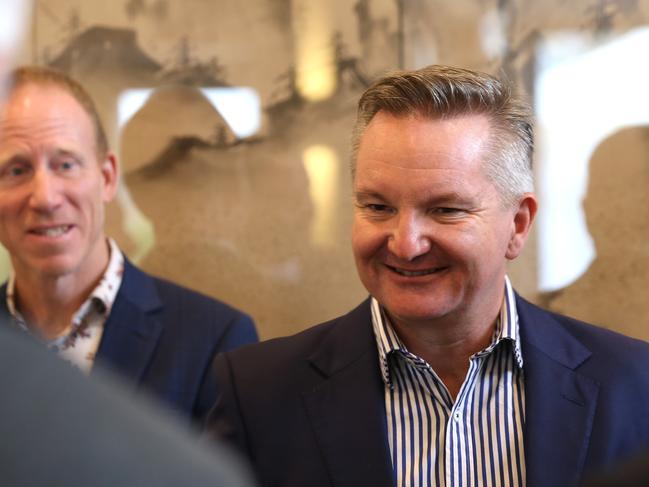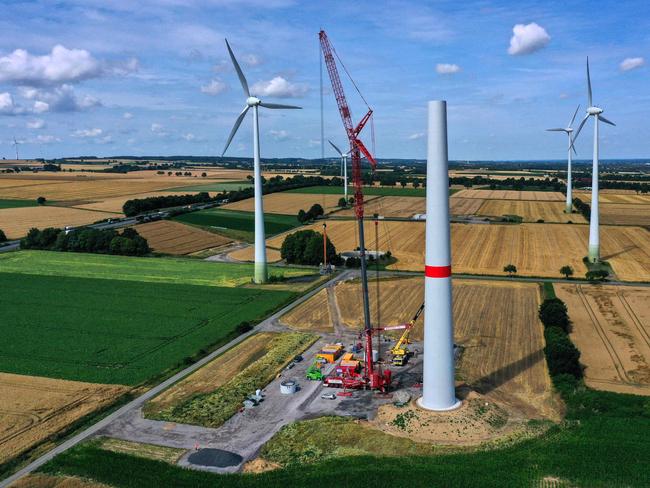Peta Credlin: Power bills are up but Labor is going to do more damage the energy sector
If you think the climate attacks on energy are bad, just wait for what’s coming next as the Albanese government prepares to inflict the same transformations on other parts of our economy, writes Peta Credlin.
Peta Credlin
Don't miss out on the headlines from Peta Credlin. Followed categories will be added to My News.
Say what you like about a Labor government but, good or bad, they don’t normally waste their time in office. Unlike the Coalition, they’ve got a bevy of friendlies in the public service to help get things done, plus an increasing number of virtue signalling corporates to sell their message, campaigning millions from their union mates and a largely compliant media that gives them the sort of positive coverage rarely afforded their Liberal counterparts.
And nowhere is this more evident than in dealing with the so-called climate emergency. The front line in the war against emissions thus far has been energy. For almost two decades, we’ve been fed an official line that renewables would make our power bills cheaper. At the election last year, the now Prime Minister even put a figure on the savings – $275 per household per year. How’s that going? Because if you’re paying the same bills that I am, they’re only going up.
But if you think the climate attacks on energy are bad, just wait for what’s coming next as the Albanese government prepares to inflict the same transformations on other parts of our economy that have already been wreaked on the energy sector.

And you will pay the price, either as taxpayers, consumers or both – that’s been estimated to cost Australia $1.5 trillion by 2030, says expert group Net Zero Australia comprised of energy specialists at the Universities of Melbourne, Queensland and the USA’s Princeton.
Last week, with all the fervour of a TV evangelist, Energy Minister Chris Bowen announced that the Climate Change Authority was now working on “sectoral net zero plans”, for the manufacturing industry, the built environment, agriculture and land, transport, and resources. These will be part of what he declared would be Labor’s “strong” 2035 emissions reductions targets, on top of the already legislated 2030 targets most energy engineers think can’t be met.
Naturally enough, this was rapturously received by the Clean Energy Council whose climate zeal happily coincides with the multibillion-dollar subsidies they’ve received for the past 15 years. Just as in energy, in these further sectors, there will soon be small armies of regulators to impose this climate socialism, plus plenty of businesses already trying to work out how they can pass the costs onto consumers.
So far, the brunt of the climate pain has been felt via power bills. It’s only now, with the coal-fired power stations that still provide more than 60 per cent of our electricity coming to the end of their lives, and with their zero-emissions replacements still largely a pipe dream, that the extent of the climate con is becoming apparent. The question is, will Australians wake up before it’s too late or will we allow government to do to agriculture, transport, mining and everything else what they have done to our energy sector and power bills? And for what? Even if we did dramatically wind back our standard of living to save the planet, has Canberra forgotten that Australia emits less than 1.3 per cent of global CO2 emissions and let’s not also forget, that China, our main strategic competitor, has emitted more CO2 in the past decade than Britain has since the Industrial Revolution.

So what’s ahead of us as the Albanese government pushes ahead with its plans to reduce our animal herds because of their methane gasses, move us all into electric cars or onto public transport, scrap manufacturing jobs, even tell us what sort of stoves we can have?
In Britain, trying to accelerate decarbonisation has led a nominally Conservative government to ban all petrol and diesel car sales from 2030 and to decree that future domestic heating must be provided through less effective heat pumps rather than gas boilers. Here in Australia, the Victorian government is considering a ban on all gas cooktops and heaters.
Some years ago, Barnaby Joyce was ridiculed for talking about the $100 Sunday roast; and my former boss Tony Abbott for predicting the demise of Whyalla as a steel town. Yet this is precisely where we’re headed if agriculture and manufacturing must be “net zero” by 2035, given that most agricultural emissions come from herd animals and, thus far, it’s simply impossible to make “green steel” at a price anyone would pay. And no one should underestimate the quasi-religious zeal that Minister Bowen and the green acolytes who now populate so many of our institutions bring to their climate goals. Just have a look at the Voice where the Yes push is driven by so many corporates and governments despite more and more voters saying they reject it.
So far, the Albanese government’s climate convictions have been quite impervious to the reality that we still rely on fossil fuels to keep the lights on. But that same climate evangelism will lead to herd limits, car bans, manufacturing shutdowns, and mandatory changes in your home unless someone in authority is prepared to shout “stop this madness” while we still can.
THE ISSUES THAT COME WITH HIGH IMMIGRATION NUMBERS
Despite all the emissions hype, at last year’s federal election, for at least 83 per cent of voters, climate change was NOT the most important issue according to the authoritative Australian Election Study that’s conducted by the Australian National University after every election. But it seems that climate is only one of the key issues where official and popular opinion are now largely at odds.
For years, it’s been economic orthodoxy that ever higher migration is good for the economy. For the federal Treasury, indeed, higher migration has become the fail-safe way to guarantee ongoing GDP growth in the absence of any real structural reform.
Even though Australia’s consistently positive overall growth masks at least three recessions over the past quarter century in terms of GDP growth per capita.
If a Resolve poll last week is right, the public are beginning to understand the difference between overall economic growth and individuals actually being better off. Unlike most economists, only 3 per cent of voters regard Australia’s overseas migration numbers as “too low”. Only 25 per cent believed that numbers currently running at about 750,000 over two years were “about right”. And 59 per cent said that current numbers were “too high”.
Unlike tourists, everyone coming to this country for more than a few months needs a house, a job and a means to get around. That’s why high levels of migration put downward pressure on wages, upward pressure on housing costs, and massive pressure on infrastructure. High levels of relatively unskilled labour help to explain our poor performance in improving productivity over the past two decades.
Even though a humane country has a duty to take in some genuine refugees, and even though modern Australia is an overall migration success story, a government’s first duty is to its own citizens. The fact that almost every migrant is better off living in Australia and that nearly all of us have migrant ancestry does not mean that migration numbers should only ever ratchet up. Yes to immigration but only at a level that remains in Australia’s national interest AND in the interests of everyone living here already.
WATCH PETA ON CREDLIN ON SKY NEWS, WEEKNIGHTS AT 6PM
More Coverage
Originally published as Peta Credlin: Power bills are up but Labor is going to do more damage the energy sector





